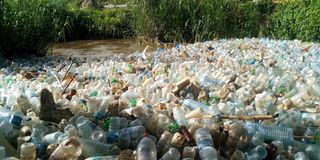Youth get tips on innovative waste disposal

What you need to know:
- “Innovations have no limits. You should not wait to be told about how the dumped plastics are grossly affecting our environment. You can pick the used plastics voluntarily, add value and contribute to a better environment,” Mr Fred Kitaka, the Luweero District Deputy speaker
As the world marked Earth Day on Monday, a section of youth in Luweero District got tips meant to contribute to a healthier environment, including reducing waste plastics.
While total elimination of plastic use may not be achievable in the short run, innovative methods targeting the used plastics can help reduce the volumes of waste.
Mr Fred Kitaka, the Luweero District Deputy speaker, wants the youth to champion innovations on how waste plastics can be reused.
“Out of the hundreds of tonnes of plastics dumped into Uganda’s open space, only nine percent is said to have been recycled. When we adopt innovative skills to re-purpose the used plastics, our environment will be safer,” he told hundreds of youth who turned up to commemorate the World Earth Day that was celebrated at Bethany Land Institute in Luweero District on Monday.
Income project
He added that the innovative use of waste plastics can act as a side income project.
“Innovations have no limits. You should not wait to be told about how the dumped plastics are grossly affecting our environment. You can pick the used plastics voluntarily, add value and contribute to a better environment,” Mr Kitaka added.
Ms Winnie Namugumya, a conservationist at Bethany Land Institute in Luweero District, said the dumped plastics are not only polluting the wetlands but that the plastic particles are getting to the human body.
The annual Earth Day, which falls on April 22, is celebrated internationally with emphasis on activities that can lead to a healthier environment. This year’s theme was “Planet versus Plastics”. Plastics are believed to generate emissions that are dangerous to the environment.
Research
The 2019 Intergovernmental Panel on Climate Change report indicated that plastics remain major contributors to greenhouse gas emissions.
It showed that there was a more than 50 percent chance that global temperature rise would reach or surpass 1.5 degrees Celsius between 2021 and 2040 across studied scenarios, and under a high-emissions pathway, specifically, the world may hit this threshold even sooner than 2037.





